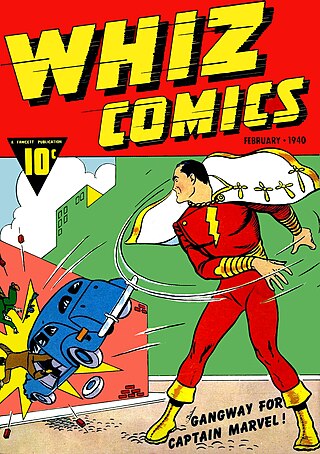
A superhero or superheroine is a stock character who typically possesses superpowers or abilities beyond those of ordinary people, is frequently costumed concealing their identity, and fits the role of the hero; typically using their powers to help the world become a better place, or dedicating themselves to protecting the public and fighting crime. Superhero fiction is the genre of fiction that is centered on such characters, especially, since the 1930s, in American comic books, as well as in Japanese media.

The damsel in distress is a narrative device in which one or more men must rescue a woman who has been kidnapped or placed in other peril. Kinship, love, lust or a combination of those motivate the male protagonist to initiate the narrative.

Barbara Gordon is a superheroine appearing in American comic books published by DC Comics, commonly in association with the superhero Batman. The character was created by television producer William Dozier, editor Julius Schwartz, writer Gardner Fox, and artist Carmine Infantino. Dozier, the producer of the 1960s Batman television series, requested Schwartz to call for a new female counterpart to the superhero Batman that could be introduced into publication and the third season of the show simultaneously. The character subsequently made her first comic-book appearance as Batgirl in Detective Comics #359, titled "The Million Dollar Debut of Batgirl!" in January 1967, by Fox and Infantino, allowing her to be introduced into the television series, portrayed by actress Yvonne Craig, in the season 3 premiere "Enter Batgirl, Exit Penguin", in September that same year.

A refrigerator, colloquially fridge, is a commercial and home appliance consisting of a thermally insulated compartment and a heat pump that transfers heat from its inside to its external environment so that its inside is cooled to a temperature below the room temperature. Refrigeration is an essential food storage technique around the world. The lower temperature lowers the reproduction rate of bacteria, so the refrigerator reduces the rate of spoilage. A refrigerator maintains a temperature a few degrees above the freezing point of water. The optimal temperature range for perishable food storage is 3 to 5 °C. A similar device that maintains a temperature below the freezing point of water is called a freezer. The refrigerator replaced the icebox, which had been a common household appliance for almost a century and a half. The United States Food and Drug Administration recommends that the refrigerator be kept at or below 4 °C (40 °F) and that the freezer be regulated at −18 °C (0 °F).

The final girl is a trope in horror films. It refers to the last girl(s) or woman alive to confront the killer, ostensibly the one left to tell the story. The final girl has been observed in many films, including Psycho, Voices of Desire, The Texas Chain Saw Massacre, Halloween, Alien, Friday the 13th, A Nightmare on Elm Street, Scream, and Train to Busan. The term was coined by Carol J. Clover in her article "Her Body, Himself: Gender in the Slasher Film" (1987). Clover suggested that in these films, the viewer began by sharing the perspective of the killer, but experienced a shift in identification to the final girl partway through the film.

Claire Bennet is a fictional character in the NBC psychological thriller superhero drama series Heroes. She is portrayed by Hayden Panettiere and first appeared on television in the pilot episode of the series, "Genesis", on September 25, 2006. She is a high school cheerleader with the power of rapid cellular regeneration. Claire appears in more episodes than any other character. In Heroes Reborn, she dies while giving birth to Malina and Tommy.

Superhero fiction is a subgenre of speculative fiction examining the adventures, personalities and ethics of costumed crime fighters known as superheroes, who often possess superhuman powers and battle similarly powered criminals known as supervillains. The genre primarily falls between hard fantasy and soft science fiction in the spectrum of scientific realism. It is most commonly associated with American comic books, though it has expanded into other media through adaptations and original works.
A Manic Pixie Dream Girl (MPDG) is a stock character type in fiction, usually depicted as a young woman with eccentric personality quirks who serves as the romantic interest for a male protagonist. The term was coined by film critic Nathan Rabin after observing Kirsten Dunst's character in Elizabethtown (2005). Rabin criticized the type as one-dimensional, existing only to provide emotional support to the protagonist, or to teach him important life lessons, while receiving nothing in return. The term has since entered the general vernacular.
The killing off of a character is a device in fiction, whereby a character dies, but the story continues. The term, frequently applied to television, film, video game, anime, manga and chronological series, often denotes an untimely or unexpected death motivated by factors beyond the storyline.
Women in Refrigerators (WiR) is a website created in 1999 by a group of feminist comic-book fans that lists examples of Women in Refrigerators syndrome, a literary trope in which female characters are injured, raped, killed, or depowered, sometimes to stimulate "protective" traits, and often as a plot device intended to move a male character's story arc forward, and seeks to analyze why these plot devices are used disproportionately on female characters.
The Hawkeye Initiative is a satirical Tumblr page similar to Women in Refrigerators that comments on the depiction and treatment of female characters and superheroes in comic books. The site features fan art of Marvel character Hawkeye in various poses held by female characters that the artists believe to be impossible or sexually provocative. The site's intent is phrased as "to draw attention to how deformed, hypersexualized, and unrealistically dressed women are drawn in comics". The site further states that these poses are seen as normal and go unnoticed by many readers when performed by female superheroes.
The strong female character is a stock character, the opposite of the damsel in distress. In the first half of the 20th century, the rise of mainstream feminism and the increased use of the concept in the later 20th century have reduced the concept to a standard item of pop culture fiction. This narrative cliche is separate and distinct from the notion of a female character who is well written, granted some form of agency, and whose actions and desires occupy a central place in the story in a way that is unusual in the history of women in literature and women in film.

Tropes vs. Women in Video Games is a YouTube video series created by Anita Sarkeesian examining gender representation in video games. The series was financed via crowdfunding, and came to widespread attention when its Kickstarter campaign triggered a wave of online harassment against Sarkeesian, causing her to flee her home at one point. Released on the channel Feminist Frequency between March 2013 and April 2017, the series consists of eighteen episodes.

Spider-Woman is a superhero appearing in American comic books published by Marvel Comics. She was created by Jason Latour and Robbi Rodriguez. The character debuted in Edge of Spider-Verse issue #2 as part of the 2014–15 "Spider-Verse" comic book storyline, leading to the ongoing series Spider-Gwen in 2015.

The Refrigerator Monologues is a 2017 superhero fiction novel by Catherynne Valente, with art by Annie Wu, exploring the lives - and deaths - of superheroines, and of the girlfriends of superheroes; the title refers to "Women in Refrigerators", and to The Vagina Monologues. It was published by Saga Press.

Invincible is an adult animated superhero television series created by Robert Kirkman for Amazon Prime Video and premiered on March 25, 2021. Based on the Image Comics series of the same name by Kirkman, Cory Walker, and Ryan Ottley, the show follows 17-year-old Mark Grayson and his transformation into a superhero under the guidance of his father Omni-Man, also known as Nolan Grayson, the most powerful superhero on the planet. During his transformation, Mark finds himself struggling between his personal life and superhero duties, where he will be forced to prove that he can be the hero that his father is. The series stars Steven Yeun, Sandra Oh, and J. K. Simmons as the Grayson family, while the rest of the cast serve as recurring characters.

"Loss", sometimes referred to as "Loss.jpg", is a strip published on June 2, 2008, by Tim Buckley for his gaming-related webcomic Ctrl+Alt+Del. Set during a storyline in which the main character Ethan and his fiancée Lilah are expecting their first child, the strip—presented as a four-panel comic with no dialogue—shows Ethan entering a hospital, where he sees Lilah weeping in a hospital bed after suffering a miscarriage. Buckley cited events in his life as inspiration for the comic.

Why Women Kill is an American dark comedy anthology television series created by Marc Cherry, which depicts the events leading to deaths caused by women. The first season, which premiered on August 15, 2019, on CBS All Access, consists of 10 episodes and is set in multiple time periods. The second season, also containing 10 episodes, premiered on June 3, 2021 on Paramount+, and changes its focus to a single time period. In December 2021, the series was renewed for a third season. However, it was scrapped before production could begin in July 2022.
WomenWriteAboutComics (WWAC) is a comic book website, founded in December 2011 by Megan Purdy. The site has been nominated four times for an Eisner Award, winning three back-to-back from 2020-2022. As of 2022, the site is run by Wendy Browne and Nola Pfau.












